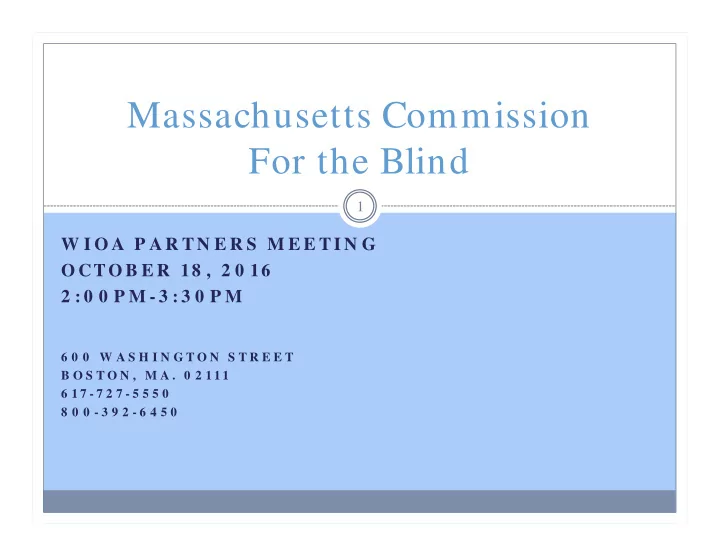

Massachusetts Commission For the Blind 1 W I O A P A R TN E R S M E E TI N G O CTO B E R 18 , 2 0 16 2 : 0 0 P M - 3 : 3 0 P M 6 0 0 W A S H I N G T O N S T R E E T B O S T O N , M A . 0 2 1 1 1 6 1 7 - 7 2 7 - 5 5 5 0 8 0 0 - 3 9 2 - 6 4 5 0
PRESENTERS 2 Thelma Williams, Regional Director Kyle Hawkins, Vocational Rehabilitation Counselor Diane Sherry, Vocational Rehabilitation Counselor Carolyn, Hjelte, Vocational Rehabilitation Counselor (Kara Sittig, VR & Children’s Supervisor)
GEOGRAPHIC AREA 3 Springfield (Region 1): Michelle Bovenzi Worcester (Region 2): Carolyn Gordon Northeast Region (Region 3): (Boston Office) Metro-West Region (Region 4): (Boston Office) Greater Boston Region (Region 6): (Boston Office)
MASSACHUSETTS COMMISSION FOR THE BLIND 4 Established in 1906 with the advocacy of Helen Keller and three others, the Massachusetts Commission for the Blind (MCB) envisions a world where blindness is no longer a barrier to full community participation and independence Provides rehabilitation, vocational and social services to individuals who are registered as legally blind
LEGAL BLINDNESS 5 Legal Blindness does not m ean total blind: MCB oversees the registration process for the reporting of legal blindness. MGL Chapter 6, Section 136 requires that all eye care providers report within 30 days all cases of legal blindness to MCB Legally, blindness is defined as less than 20/ 200 vision in the better eye (vision of 20/ 200 is the ability to see at 20 feet only what the normal eye can see at 200 feet)
MASSACHUSETTS COMMISSION FOR THE BLIND 6 Serves people from all ages with a variety of services: Children’s Services Social Rehabilitation Vocational Rehabilitation Rehabilitation Teaching/ Vision Rehabilitation Therapy Deaf Blind and Extended Services BRIDGE Orientation and Mobility Assistive Technology
TYPES OF VISUAL IMPAIRMENTS 7 Structural Structural Neurological Neurological Glaucoma Traumatic Brain Injury (TBI) Cataracts Closed Head Injury Retinal Detachment Cortical Visual Diabetic Retinopathy Impairment (CVI) Kerataconus Cerebrovascular Accident Optic Nerve Atrophy (CVA)/ Stroke Neurological/ Genetic Etiology
Glaucoma – characterized by increased intraocular pressure resulting in damage to the optic nerve and retinal nerve fibers, resulting in peripheral visual field loss 8 Norm al Vision Norm al Vision Glaucom a Glaucom a
Cataracts – clouding of the lens preventing a clear image from forming on the retina; like looking through wax paper 9 Norm al Vision Norm al Vision Cataracts Cataracts
Retinal Detachment – separation of the retina from the underlying tissue-“like a curtain coming down” 10
Diabetic Retinopathy – retinal changes due to Diabetes Mellitus, eventually resulting in the growth of abnormal new blood vessels causing distortion/ disruption to vision 11
Vocational Rehabilitation Services 12 Assist individuals with legal blindness to obtain and maintain gainful employment. Aid consumers in overcoming barriers in the workplace. Provide worksite accommodations Provide post-employment supports to maintain and/ or retain employment
Vocational Rehabilitation Services 13 Ages 18+ Eligibility Requirements Low- Vision (new 2016) Pre- Employment Transition Services Internship Program Post-Employment Assistive Technology O&M
PARTNERS 14 Partners Health Care Boston Public Schools Legal Sea Foods MBTA Secretary of the Commonwealth NSTAR Harvard University Hampden County Correctional Facility Spaulding Rehab
PARTNERS 15 Fidelity Verizon Newton Wellesley Hospital Pearson Education Group Brigham & Women’s Hospital UMass Hampden County Correctional Facility Intel John Hancock
WORKFORECE DEVELOPMENT 16 Over 100 years of experience Sustainable Partnerships Strong Corporate Relationships Innovative Community Affiliates Training & On-Site Supports
CHALLENGES 17 Accessibility Adaptive Technology Reasonable Accommodations Lack of Disability Awareness Language and Cultural Issues Inclusiveness
WHERE DO WE GO FROM HERE? 18 Expand Outreach Efforts Education Disability Awareness Training
19 Thank You
QUESTIONS 20
Recommend
More recommend